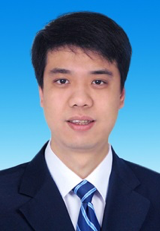
WEI GangPh.D.
- Academic title:Principal Investigator
- Discipline:Epigenetics and Bioinformatics
- Departments:Epigenomics in Immune System
- Phone:
- E-mail:gwei@siii.cas.cn
- Mailing Address:Life Science Research Building, 320 Yueyang Road, Xuhui District, Shanghai 200031, P.R. China
Academic Experience
2024-present Principle investigator, Shanghai Institute of Immunity and Infection, CAS
2017-2024 Principle investigator, Shanghai Institute of Nutrition and Health, CAS
2012-2017 Principle investigator, CAS-MPG Partner Institute of Computational Biology, CAS
2005-2011 Postdoctoral fellow, National Heart, Lung and Blood Institute, National Institutes of Health (NIH)
Education
2000-2005 Ph.D., Peking University
1996-2000 B.S., Peking University
Our research interest is focused on Epigenomics in immune system. By combining multi-omics approaches with computational analysis, we will be investigating the epigenomic dynamics and the underlying regulatory mechanisms in the process of immune cell differentiation, immune memory, immune aging and immune response against tumors. In particular, our research will cover these directions: 1) develop single-cell three-dimensional genome technology and related bioinformatic analysis methods to dissect the dynamics, heterogeneity and regulatory function of higher-order chromatin structure in immune cells; 2) investigate how higher-order chromatin structures change and how they contribute to the transcription regulation in the process of T cell differentiation, T cell exhaustion and T cell aging; 3) genome-wide identify transposon element (TE) derived new antigens in tumors using single-cell multi-omics data.
1) Zhang G, Li Y#, and Wei G# (2023) Multi-omic analysis reveals dynamic changes of three-dimensional chromatin architecture during T cell differentiation. Communications Biology. 6: 773.
2) Zhang Y, Cao X, Gao Z, Ma X, Wang Q, Xu X, Cai X, Zhang Y, Zhang Z, Wei G # and Wen B # (2023) MATR3-antisense LINE1 RNA meshwork scaffolds higher-order chromatin organization. EMBO reports. 24: e57550.
3) Cao X, Wen Y, Li Y, Ma X, Jing Q, Jiang L # and Wei G # (2023) PfSET2 is involved in genome organization of var gene family in Plasmodium falciparum. Microbiology Spectrum. 11: e0389122.
4) Wang X, Yan J, Ye Z, Zhang Z, Wang S, Hao S, Shen B, Wei G # (2022) Reorganization of 3D chromatin architecture in doxorubicin-resistant breast cancer cells. Front Cell Dev Biol. 5: 10:974750.
5) Ma X, Cao X, Zhu L, Li Y, Wang X, Wu B, Wei G # and Hui L # (2021) Pre-existing chromatin accessibility of switchable repressive compartment delineates cell plasticity. National Science Reviews. 9: nwab230.
6) Wang X, Yan J, Shen B, Wei G. # (2021). Integrated Chromatin Accessibility and Transcriptome landscapes of Doxorubicin-resistant breast cancer cells. Front Cell Dev Biol. 9: 708066.
7) Lu B, Liu M, Gu L, Li Y, Shen S, Guo G, Wang F, He X, Zhao Y, Shang X, Wang L, Yang G, Zhu Q, Cao J, Jiang C, Culleton R, Wei G# and Zhang Q# (2021) The Architectural factor HMGB1 is involved in genome organization in the human malaria parasite Plasmodium falciparum. mBio. 12: e00148-21.
8) Lai Y, Cao X, Chen J, Wang L, Wei G #, Wang S# (2020) Coordinated regulation of infection-related morphogenesis by the KMT2-Cre1-Hyd4 regulatory pathway to facilitate fungal infection. Science Advances. 6: eaaz1659.
9) Zhang Y, Zou X, Qian W, Weng X, Zhang L, Zhang L, Wang S, Cao X, Ma L, Wei G #, Wu Y #, Hou Z #. (2019) Enhanced PAPSS2/VCAN sulfation axis is essential for Snail-mediated breast cancer cell migration and metastasis. Cell Death Differ. 26: 565-579.
10) Ji S, Zhu L, Gao Y, Zhang X, Yan Y, Cen J, Li R, Zeng R, Liao L, Hou C, Gao Y, Gao S, Wei G# and Hui L# (2017) Baf60B-mediated ATM-p53 activation blocks cell identity conversion by sensing chromatin opening. Cell Research. 27: 642-656.
11) Gao Y, Zhang X, Zhang L, Cen J, Ni X, Liao X, Yang C, Li Y, Chen X, Zhang Z, Shu Y, Cheng X, Hay D, Lai D, Pan G, Wei G# and Hui L#. (2017) Distinct gene expression and epigenetic signatures in hepatocyte-like cells produced by different strategies from the same donor. Stem Cell Reports. 9: 1813-1824.
12) Li Q, Lei P, Zhao Q, Li L, Wei G# and Wu M#. (2017) Epigenomic analysis in a cell-based model reveals the roles of H3K9me3 in breast cancer transformation. Epigenomics. 9:1077-1092.
13) Lv X, Han Z, Chen H, Yang B, Yang X, Xia Y, Pan C, Fu L, Zhang S, Han H, Wu M, Zhou Z, Zhang L, Li L, Wei G# and Zhao Y#. (2016) A positive role for polycomb in transcriptional regulation via H4K20me1. Cell Research. 26: 529-542.
14) Zhao Q, Lei P, Zhang X, Zheng J, Wang H, Zhao J, Li Y, Ye M, Li L, Wei G# and Wu M#. (2016) Global histone modification profiling reveals the epigenomic dynamics during malignant transformation in a four-stage breast cancer model. Clinical Epigenetics. 8: 34.
15) Gu J, Wang D, Zhang J, Zhu Y, Li Y, Chen H, Shi M, Wang X, Shen B, Deng X, Zhan Q, Wei G# and Peng C#. (2016) GFRalpha2 prompts cell growth and chemo-resistance through down-regulating tumor suppressor gene PTEN via Mir-17-5p in pancreatic cancer. Cancer Letters. 380: 434-441.
16) Chepelev I*, Wei G*, Wangsa D, Tang Q and Zhao K (2012). Characterization of genome-wide enhancer-promoter interactions reveals co-expression of interacting genes and modes of higher order chromatin organization. Cell Research. 22: 490-503.
17) Wei G*, Abraham B*, Yagi R*, Jothi R*, Cui K, Sharma S, Narlikar L, Northrup D, Tang Q, Paul W, Zhu J and Zhao K (2011). Genome-wide analyses of transcription factor GATA3-mediated gene regulation in distinct T cell types. Immunity. 35: 299-311.
18) Wei G*, Wei L*, Zhu J, Zang C, Hu-Li J, Yao Z, Cui K, Kanno Y, Roh T, Watford W, Schones D, Peng W, Sun H, Paul W, O’Shea J and Zhao K (2009). Global mapping of H3K4me3 and H3K27me3 reveals specificity and plasticity in lineage fate determination of differentiating CD4+ T cells. Immunity. 30: 155-167.

